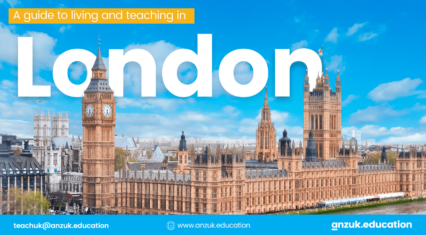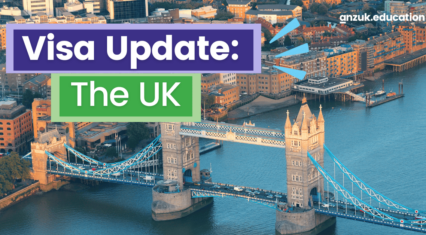Search
Get Started
Teaching in the UK from a Canadian Perspective
After growing up in a Canadian school system and then teaching in it for a couple of years there was a lot of change for me during my one-year teaching in England.
I graduated from the University of Western Ontario with my B.Ed in 2015 and was off to teach in England, in the eastern part of London for my first (post teachers’ college) crack at teaching. I began as a substitute teacher but managed to get a contract role for the last three months I was there.
I taught nearly every subject and grade during my year there and got a lot of great experience. This blog will focus on some of the things that were new to me teaching in England. From school breaks to the dress code, to how the schools are ranked. Please feel free to reach out if you wanted to hear more about anything covered in this blog. ca@anzuk.education
School Breaks:
The UK School year is quite different from the one we are used to in Canada. They start in September, like ours, but have a break every six weeks that alternates between one week and two weeks.
They also go up until almost the end of July and then have all of August off for summer holidays
An example of their school calendar is:
Autumn Term:
Wednesday 2 September – Friday 23 October 2020
1 week off
Monday 2 November – Friday 18 December 2020
2 weeks off
Spring term:
Monday 4 January – Friday 12 February 2021
1 week off
Monday 22 February – Wednesday 31 March 2021
2 weeks off
Summer term:
Monday 19 April – Friday 28 May 2021
1 week off
Monday 7 June – Friday 23 July 2021
6 weeks off for Summer
I enjoyed this setup, for the most part. I really liked it because it allowed for a lot of travelling time and it fit perfectly for what I wanted to get out of my year abroad. However, I did find it was a lot of starting and stopping and the school year felt long. I do not think I would like it as a career teacher and prefer the way we have the school year set up in Canada.
Dress Code – Students and Staff:
Almost all schools in the UK require students to wear uniforms and they are very strict on this. I found that it becomes a way of becoming malicious for students to not wear their uniforms properly which can be challenging to continually have that talk with certain students.
For staff, I found a good amount of pressure to dress professionally each day. It can depend on the school but at the minimum, I would expect as a guy to wear a dress shirt, tucked in with dress pants and dress shoes. Some schools will expect a tie and even a suit jacket to be worn as well. For women, there is a bit more flexibility but still, a professional standard must be met.
I remember one story very well regarding dress code. I had forgotten to wear a tie one day at a school I was quite frequently at as a supply teacher. The headteacher came up to me in the middle of a class and handed me a clip-on tie to wear for the rest of the day.
Sports in the classroom:
As a PE teacher I was very interested in the sports they teach in the school system and how PE is taught. In elementary school’s the classroom teacher is responsible for teaching the class PE. I did not like this because I saw some teachers use PE as a reward for good behavior or taking it away for bad behavior, which I don’t agree with.
The sport ALL the kids want to play is soccer or “football” as you will hear. All the kids absolutely love it and I found almost every day I would get asked “Sir, who do you support?” Meaning which team, I was a fan of in the premier league (The highest soccer league in the UK).
Other sports that were new to me to teach were field hockey, netball and rounders. If you want to talk about ice hockey you have to be sure to include the word “ice” because just hockey to a Brit means field hockey. Netball is sort of like a version of basketball, which I wasn’t very fond of. Rounders is a weird version of baseball that I couldn’t quite wrap my head around. I also found that track and field was a lot more pronounced and a part of what the kids did, more often than how much we do it in Canada.
Travelling:
The draw to teaching in the UK for me was above all the opportunity it gave me to travel to the rest of Europe. As I went over with three other teachers, we all had the same breaks and were always planning for the next trip well in advance. By the end of the year, we had all been to around 13 countries and there wasn’t one break where we stayed in England.
By no means were we staying in the Ritz or eating steak dinners every night where we went, we budgeted constantly, and I usually gave myself an allowance to spend each day. We would stay in hostels with the rare air bnb thrown in there. Hostels are ideal for meeting people as well as finding things to do. A great book I read prior to the UK was The Savvy Backpacker’s Guide to Europe on a Budget, I found it super helpful with good tips on how to budget.
Logistically, we would always plan our trips to countries that were near one another and give ourselves a minimum of 2-3 days per city. In hindsight, some cities needed more days, and some could have used less. We would never pack a bag and always look into the size of carry ons for each airline we flew with. Ryanair and Wizz are two budget airlines we usually used and Flixbus and megabus are two great bus companies.
Currency exchange is a big one that you need to think about prior to any trip. We would always go to a local currency exchange shop in London prior to a trip. The airports charge an arm and a leg for you to do the same thing. Do some research into how much things cost where you are going prior to departure to get a sense of how much you need. And if you want your money to go the longest than may I suggest a cheaper destination I.E Budapest, I went twice and loved it, for more reasons than just the cheap beer!
Another thing we tried to do was to line up events for when we were travelling. Look at different popular events going on around Europe throughout the year and try to get in as much as you can. Some common ones would be Oktoberfest in Germany or the Tulip Festival in the Netherlands. We managed to watch Canada play in the World Juniors in Helsinki over Christmas time, it was a great way to connect with a ton of other Canadians.
There is a whole lot more when it comes to destinations, how and when to travel so always free to reach out. It is my favorite part of the experience to discuss so always open to have a chat.
No School Boards/Districts:
One of the main reasons for education agencies such asanzuk education in the UK is because the UK does not have the same hiring process as Canada when it comes to education. Primarily because they do not have “school boards”.
In Canada, each board works to set parameters, distribute funding, and most importantly hire teachers! A common process in Canada would be, to get hired onto a board/district, work on the supply/substitute (occasional teaching) list, build rapport and experience within the board through LTO (Long term positions) or contracts, and then transition into a permanent role which gives you the ability to work permanently at any school within the board.
The schools in the UK however do not have boards to draw on a pool of potential teachers or daily relief teachers. Each school (even publicly funded) works with a lot more autonomy. They can hire teachers they feel are the right fit and do not have to directly consider experience, seniority or other boards when hiring.
This allows anzuk education to work with schools from all over the UK without faultline restrictions. Our job at anzuk is to assist schools in finding quality educators and provide a pool of teachers for them to access. This pool of teachers would otherwise be unavailable if a school had to individually hire every single supply teacher, or post job ads for every vacancy.
This process works out great for educators who might not have as much experience after graduation that are looking for their own class or anyone who is looking to try teaching in multiple environments. The goal is to act like a board, only without restrictions by the district.
OFSTED (expectations of a teacher):
Since there are no boards to set expectations, guidelines and overview there is a separate entity that works in a similar fashion. OFSTED (Office for Standards in Education) is the department in the UK that reports to parliament to maintain quality in education from an independent and impartial view. OFSTED will inspect schools and other educational institutions and report back with a school rating on a scale of 1 (outstanding) to 4 (inadequate). These OFSTED ratings are public knowledge and can normally be found on the individual school website. An example of what they would look like can be found here.
The inspections and reports are usually a new experience for Canadian educators. As a Canadian educator we do have our own evaluations and assessments throughout our careers, although this is normally feedback based, it does not normally reflect directly on the school and is certainly not given a number for our competencies. That being said, individual schools and headteachers should prepare international or new educators as to what to expect. In my experience, it was something that felt like a lot of pressure. They will look at your classroom workbooks, marking, lesson/unit plans and instructional methods, which for a teacher in a new country can be daunting. Ultimately, your school and anzuk are here for any questions or concerns as Ofsted will have to give notice before coming in to inspect, which will allow time for you to properly prepare.
Field Trips:
Some of the best experiences I had from teaching in the UK were the field trips. If you are lucky enough to be at a school or in a position to host a field trip, I highly recommend it!
Some differences for starters were the UK does not have big yellow school busses that take you from the front of the school to your destination. Most field trips that are a reasonable distance will be taken on public transport. Don’t worry, the schools have great systems in place (such as high vis vests, travel cards, volunteers and maps) to make it easy! The staff on public transport will be expecting it as well and happy to help as it is very common.
The rest of the trip is very similar in structure to Canada with packed lunches, excited students and guided tours. Except this isn’t your local skating rink or swimming pool, instead it is to places like Tower Bridge, Big Ben, Natural History Museum or another treasured British landmark!
Supply Teaching Expectations:
I supply taught in the UK for seven of the twelve months I was there. I found some of the expectations on me were a little different than what is expected of me as a supply teacher in Canada.
Schools will expect you to mark the work in elementary schools that you did with the students the day or days you were there. On one occasion a school called me back because I had forgotten to mark some of the work, I did with the kids the day I was in.
Teachers were pretty good for the most part at leaving a day plan for me that was easy to follow. Some days I had to pull from my “bag of tricks” if there was nothing left for me. No matter where you supply teach though it is always a great idea to have a fall back plan in case nothing is left for you.
Final Thoughts:
I hope this blog was useful if you are a Canadian teacher thinking about teaching in the UK. Look out as we will be preparing a similar one for teaching in Australia. Always feel free to reach out to our Canadian team via email @ca@anzuk.education.






